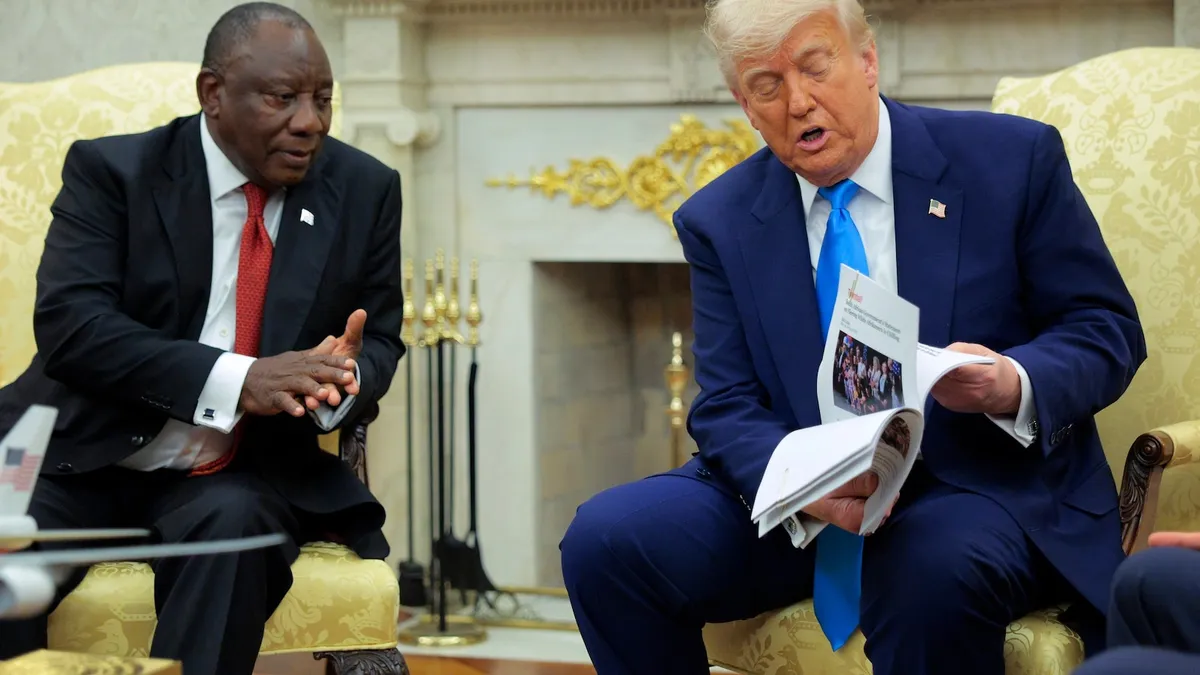
On Wednesday, a highly charged meeting took place in the Oval Office between President Donald Trump and South African President Cyril Ramaphosa. During this encounter, President Trump confronted Ramaphosa with alarming images and video clips, alleging an ongoing genocide against white farmers in South Africa. However, the footage cited by Trump, which depicted a series of crosses, was misrepresented. He claimed these were burial sites for white farmers, saying, "Each one of those white things you see is a cross. And there's approximately a thousand of them. They're all white farmers, the family of white farmers." Trump concluded with a grave assertion that "those people are all killed."
Contrary to Trump's assertions, the video he referenced actually captured a protest that occurred on September 5, 2020, near Normandien, South Africa. This protest was organized in response to the reported murders of two farmers in the vicinity just days prior, as reported by the local outlet Newcastle Advertiser. According to their coverage, the crosses were placed along the protest route by volunteers to commemorate the victims and were not indicative of burial sites.
The South African Institute of Race Relations corroborated this information, stating that the crosses symbolized victims of farm murders and were part of a processional protest following the tragic deaths of Glenn and Vida Rafferty, who were brutally killed on their farm in Normandien, KwaZulu-Natal. Hermann Pretorius, a spokesperson for the Institute, emphasized to ABC News that these crosses were not graves but rather temporary memorials. Further investigation revealed that images from Google Street View taken in May 2023 confirmed the absence of these crosses, dispelling Trump's claims.
In the video shared by Trump, a figure wearing a red beret can be heard chanting divisive slogans such as "Kill the boer, kill the farmer," advocating for land expropriation without compensation. This individual is Julius Malema, the founder of the radical political party Economic Freedom Fighters, who was expelled from the African National Congress, the party to which Ramaphosa belongs, in 2013. Another notable figure in the video, dressed in a yellow shirt, is former South African President Jacob Zuma, the current leader of the opposition uMkhonto weSizwe (MK) party.
In response to Trump's video, President Ramaphosa clarified that the extremist speeches showcased do not reflect the policies of his government. He noted that South Africa's agricultural sector has made significant strides to keep extremist views out of governance. Additionally, the country's opposition agriculture minister echoed this sentiment, emphasizing a collective effort to combat radicalism.
During the Oval Office meeting, Trump also shared a printout of a blog post that included an image of the Democratic Republic of the Congo, suggesting it was from South Africa. This claim adds to the ongoing controversy surrounding Trump's allegations about violence against white South Africans, a narrative that has been consistently rejected by Ramaphosa, major political parties in South Africa, and judicial authorities. Notably, a South African court ruled in February 2025 that claims of white genocide are unfounded, labeling them as "not real" and "clearly imagined."
While it is true that some farmers face violence in South Africa, the overall murder rate is significantly high across all demographics. In 2023, the murder rate stood at 45 per 100,000 people, yet there is no evidence to suggest that these murders are racially motivated. In light of these statistics, Ramaphosa highlighted during the meeting that the victims of violent crime in South Africa are predominantly Black, stating, "People who do get killed, unfortunately, through criminal activity are not only white people; the majority of them are Black people."
Following the meeting, the White House released a statement titled "President Trump is Right About What’s Happening in South Africa," reiterating the administration's baseless claims of race-driven violence in the nation. The statement included a collection of press clippings purporting to support their position, referencing articles from outlets such as Fox News, Breitbart, and the BBC. However, many of these clippings focused on isolated incidents of violence rather than substantiating claims of systemic racial targeting.
This meeting and the mischaracterizations surrounding it have sparked intense debate and scrutiny regarding the portrayal of violence in South Africa, highlighting the complex dynamics of race and crime in the country today. Contributions to this report were made by ABC News reporters Chris Looft, Kerem Inal, Lena Camilletti, and Gaby Vinick.